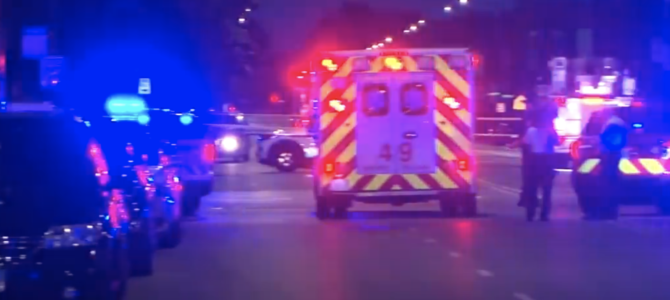
Chicago is a city rife with villains, but its people are good. And they’re deserving of the safety that law and order provide.
As a rising senior at the University of Chicago, I’ve lived in the Hyde Park neighborhood on Chicago’s South Side for the past three years. Concerned parents of prospective UChicago students often ask me whether it’s reasonable to entrust their children to my community. No matter how I respond, my “answer” is burdened with guilt.
The guilt is two-fold. The first wave of guilt stems from the idea that I might be turning others away from my second home, that I might be dissuading scholars from an institution that has pushed me further as a human being than I ever thought possible, that I might contribute to an exodus of residents that would impoverish my neighbors.
When the second wave of guilt hits, it’s just as powerful as the first. I’m terrified that, by encouraging others to join my community, they might be put in harm’s way. I fear that, like Max Lewis, my future peers might be gunned down on the Chicago CTA train, or that, like Yiran Fan, they might be viciously murdered in a South Side parking garage.
I fear for the safety of my friends and classmates, as well as my own. And I feel for my parents, who worry deeply about where I choose to call home.
Yet I return to the city, over and over again. I refuse to surrender its streets to violence and bloodshed. When forced to choose between fight or flight, there’s only one option: good Chicagoans—of which there are many—must not abandon our city. And we owe it to ourselves and our community to demand that Chicago do better.
How Bad Is It Really?
Chicago’s official website says, “Mayor Lightfoot’s pledge is to make Chicago the safest big city in America.” Clearly, that’s not happening under Lori Lightfoot’s failed leadership. Chicagoans are dying, and platitudes don’t save lives. If anything, they’re an offensive distraction from the community’s suffering.
As of July 26, Chicago’s own statistics show that the city’s aggravated assault victimizations are up 14.4 percent, total shooting victimizations are up 9.7 percent, and vehicular hijacking victimizations have surged 44.6 percent. The Chicago Tribune adds that more than 2,000 Chicagoans have been shot this year, while more than 360 have been victims of homicide.
For a rough comparison, consider that 1,833 Americans were killed in action in Afghanistan between late 2001 and 2014, averaging 141 deaths per year. In a shorter time span, 4,724 Americans were killed in Chicago between 2011 and 2019, averaging a staggering 525 deaths per year.
Chicago’s 2011-2019 statistics are horrible, but since Lightfoot assumed office on May 20, 2019, the Tribune’s metrics show the city’s homicide rate has gotten even worse.
Criminals Are Terrorizing My Neighborhood
My own neighborhood is not immune to these trends. Thanks to the tireless efforts of the University of Chicago Police Department (UCPD), my campus is relatively fortified (it has to be, in order to maintain tuition-payers). But UChicago is not an island—nor should it be.
My peers and I are inextricably tied to our surrounding South Side community. As UCPD’s crime bulletin illustrates, violent crime and property crime rates are surging in most of the department’s patrol area, which encompasses the Hyde Park, Kenwood, and Oakland neighborhoods, as well as sections of Woodlawn.
To put this area’s crime surge in perspective, UCPD responded to an attempted vehicular hijacking in its patrol area on July 20. Just two days after that, both Chicago Police and UCPD officers “responded to a call of a person shot off-campus in [an] alley.” Upon arrival, they found one victim who’d been shot in the head, while a second had been shot in the arm. They classified it as an aggravated battery.
Four days after that, CPD and UCPD yet again “responded to calls of shots fired off-campus.” Upon arrival, they found a parked vehicle that had been shot up, although it was luckily unoccupied. Just a day after that, three armed robberies and an aggravated vehicular hijacking were reported to UCPD.
In case you lost track of the timeline, all of these crimes were reported in the span of eight days, between Tuesday, July 20 and July 27. So that’s just about one week of horrific crime (albeit a particularly egregious one). Clearly, lawlessness is rampant.
There Are People Behind the Numbers
After two of my peers were murdered in Lightfoot’s city, a 73-year-old veteran named Keith Cooper was beaten to death outside my local CVS on July 14. Cooper was walking toward the pharmacy when an assailant allegedly snuck up behind him and stole his car keys. As Cooper screamed for help, the prosecutor said a second assailant beat Cooper in the head, while the first assailant pushed him in the chest.
The attackers couldn’t figure out how to get in Cooper’s car, so they fled. Meanwhile, their victim fell to the ground and stopped breathing. The attempted carjacking failed, but it cost Cooper his life.
The murderers didn’t jump Cooper in the middle of some abandoned strip mall. Just the opposite: in Lightfoot’s lawless city, they were emboldened to kill their elderly victim in a busy parking lot in broad daylight on 53rd Street, just blocks from campus.
One of Cooper’s alleged murderers, Frank Harris, had already pleaded guilty to a prior vehicular hijacking. In case it couldn’t get worse, Assistant Public Defender Robyn Hayns told CWB Chicago that Harris is a paid employee of “GoodKidsMadCity,” a group of radicals dedicated to abolishing the police.
As Cooper’s horrific demise shows, there are human beings behind every crime statistic.
Rage, Rage, Against the Dying of the Light
As Americans, we’re often outraged at each other, our institutions, and ourselves. But if we set aside the performative hysteria and politicking, some issues transcend hollow activism. My neighbors getting murdered in Chicago’s streets is one of them.
Every day, Chicago’s brave police officers defend our streets. They put their lives on the line to protect us, and they are forever deserving of our gratitude. But while first responders clean up innocents’ blood and law enforcement pursues the perpetrators, they alone cannot heal our city.
Too often, we become desensitized and complacent toward violence. We read the latest headlines about our city’s crime, only to move on with our days. We assume the violence will only touch others, and we wait for “the experts” and career politicians to remedy our community’s pain. This mindset needs to change.
Rather than wait on the failed leadership of Lightfoot and her partisan peers to “fix” our city, local leaders and next-door neighbors need to unite to seek solutions. Unlike Chicago city officials, we don’t have bodyguards. We have more to lose than political capital, and we need to fight back.
The standard we’ve set for our city is unacceptable. And my phrasing is intentional, because the entire community sets the tone, not only for what we’re willing to permit, but for what we’re willing to suffer. And Chicagoans have quietly suffered for far too long.
As a community, we need to work toward, and vote for, better. Only then may we overthrow the villains who terrorize our streets.









